初中英语研究性学习报告范文精选5篇-口语研究性报告范文
英语研究性学习结题报告(5篇范例)
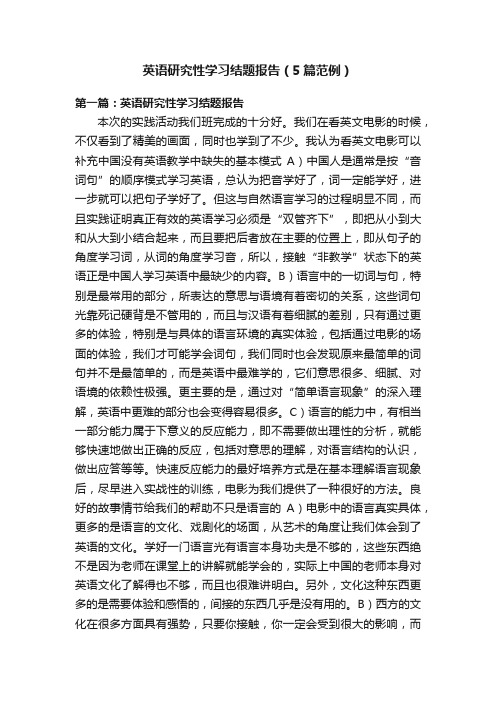
英语研究性学习结题报告(5篇范例)第一篇:英语研究性学习结题报告本次的实践活动我们班完成的十分好。
我们在看英文电影的时候,不仅看到了精美的画面,同时也学到了不少。
我认为看英文电影可以补充中国没有英语教学中缺失的基本模式A)中国人是通常是按“音词句”的顺序模式学习英语,总认为把音学好了,词一定能学好,进一步就可以把句子学好了。
但这与自然语言学习的过程明显不同,而且实践证明真正有效的英语学习必须是“双管齐下”,即把从小到大和从大到小结合起来,而且要把后者放在主要的位置上,即从句子的角度学习词,从词的角度学习音,所以,接触“非教学”状态下的英语正是中国人学习英语中最缺少的内容。
B)语言中的一切词与句,特别是最常用的部分,所表达的意思与语境有着密切的关系,这些词句光靠死记硬背是不管用的,而且与汉语有着细腻的差别,只有通过更多的体验,特别是与具体的语言环境的真实体验,包括通过电影的场面的体验,我们才可能学会词句,我们同时也会发现原来最简单的词句并不是最简单的,而是英语中最难学的,它们意思很多、细腻、对语境的依赖性极强。
更主要的是,通过对“简单语言现象”的深入理解,英语中更难的部分也会变得容易很多。
C)语言的能力中,有相当一部分能力属于下意义的反应能力,即不需要做出理性的分析,就能够快速地做出正确的反应,包括对意思的理解,对语言结构的认识,做出应答等等。
快速反应能力的最好培养方式是在基本理解语言现象后,尽早进入实战性的训练,电影为我们提供了一种很好的方法。
良好的故事情节给我们的帮助不只是语言的A)电影中的语言真实具体,更多的是语言的文化、戏剧化的场面,从艺术的角度让我们体会到了英语的文化。
学好一门语言光有语言本身功夫是不够的,这些东西绝不是因为老师在课堂上的讲解就能学会的,实际上中国的老师本身对英语文化了解得也不够,而且也很难讲明白。
另外,文化这种东西更多的是需要体验和感悟的,间接的东西几乎是没有用的。
B)西方的文化在很多方面具有强势,只要你接触,你一定会受到很大的影响,而这种影响不仅对语言的学习有好处,而且对你的思想、价值观、知识面等等都会有很大的影响。
英语研究性学习报告(12篇范文)

英语研究性学习报告(12篇范文)(经典版)编制人:__________________审核人:__________________审批人:__________________编制单位:__________________编制时间:____年____月____日序言下载提示:该文档是本店铺精心编制而成的,希望大家下载后,能够帮助大家解决实际问题。
文档下载后可定制修改,请根据实际需要进行调整和使用,谢谢!并且,本店铺为大家提供各种类型的经典范文,如工作报告、合同协议、心得体会、演讲致辞、规章制度、岗位职责、操作规程、计划书、祝福语、其他范文等等,想了解不同范文格式和写法,敬请关注!Download tips: This document is carefully compiled by this editor. I hope that after you download it, it can help you solve practical problems. The document can be customized and modified after downloading, please adjust and use it according to actual needs, thank you!Moreover, our store provides various types of classic sample texts, such as work reports, contract agreements, insights, speeches, rules and regulations, job responsibilities, operating procedures, plans, blessings, and other sample texts. If you want to learn about different sample formats and writing methods, please pay attention!英语研究性学习报告(12篇范文)【第1篇】英语研究性学习报告一、英语研究性学习不同于英语学科教学1.作为一门课程,“问题”是研究性学习的载体,整个教学过程围绕着问题的提出──寻找收集资料──分析研究问题──解决问题来组织学生进行学习活动。
英语研究性学习报告
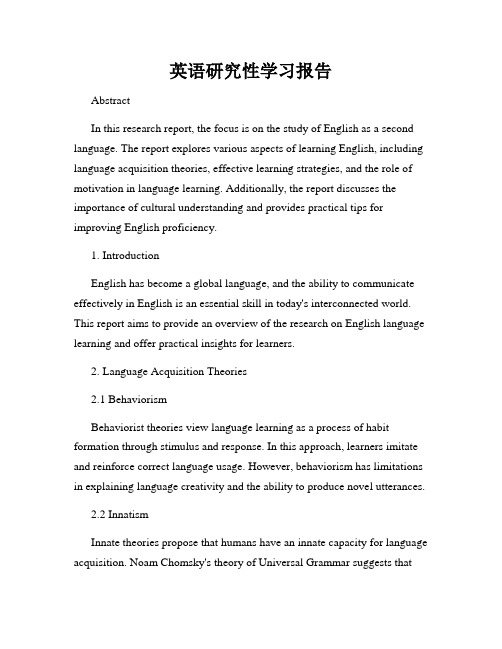
英语研究性学习报告AbstractIn this research report, the focus is on the study of English as a second language. The report explores various aspects of learning English, including language acquisition theories, effective learning strategies, and the role of motivation in language learning. Additionally, the report discusses the importance of cultural understanding and provides practical tips for improving English proficiency.1. IntroductionEnglish has become a global language, and the ability to communicate effectively in English is an essential skill in today's interconnected world. This report aims to provide an overview of the research on English language learning and offer practical insights for learners.2. Language Acquisition Theories2.1 BehaviorismBehaviorist theories view language learning as a process of habit formation through stimulus and response. In this approach, learners imitate and reinforce correct language usage. However, behaviorism has limitations in explaining language creativity and the ability to produce novel utterances.2.2 InnatismInnate theories propose that humans have an innate capacity for language acquisition. Noam Chomsky's theory of Universal Grammar suggests thatlanguage acquisition is governed by innate linguistic principles. Innatism emphasizes the role of inherent language structures and rules.2.3 Cognitive ApproachesCognitive theories consider language learning as a cognitive process that involves mental processes such as memory, attention, and problem-solving. Cognitive approaches highlight the importance of meaningful learning, schema activation, and metacognitive strategies in second language acquisition.3. Effective Learning Strategies3.1 Vocabulary AcquisitionBuilding a strong vocabulary is crucial for English language learners. Effective strategies for vocabulary acquisition include using flashcards, context clues, and mnemonic devices. Regular practice and exposure to authentic language materials are also beneficial.3.2 Listening and Speaking SkillsActive listening and speaking practice enhance oral communication skills. Strategies such as shadowing, language exchanges, and engaging in authentic conversations can improve fluency and pronunciation. Watching English movies, listening to podcasts, and participating in language clubs or conversation groups are recommended.3.3 Reading and Writing SkillsReading extensively exposes learners to various language structures and vocabulary. Strategies like skimming, scanning, and active reading canenhance comprehension. Writing practice, including journaling, essay writing, and language exchange programs, helps develop writing skills through feedback and self-reflection.4. Motivation in Language LearningMotivation plays a vital role in language learning success. Internal and external motivation factors influence learners' dedication and effort. Intrinsic motivation, such as personal interest and enjoyment of the language, is more effective in sustaining long-term commitment. Teachers and parents can foster motivation through positive reinforcement and creating a supportive learning environment.5. Cultural UnderstandingUnderstanding the cultural context of a language is crucial for effective communication. Cultural competence involves awareness, sensitivity, and respect for different customs, beliefs, and values. Language learners should explore cultural aspects through literature, films, and intercultural exchanges to enhance their proficiency and cross-cultural communication skills.6. Practical Tips for Improving English Proficiency6.1 Practice regularly: Consistent practice is key to improving English skills. Set aside dedicated study time and engage in daily activities like reading, listening, speaking, and writing in English.6.2 Set specific goals: Clearly define your language learning goals and create a plan to achieve them. Setting achievable milestones and tracking progress will provide a sense of accomplishment and motivation.6.3 Seek authentic interactions: Practice English with native speakers or fellow learners through language exchanges, online forums, or conversation groups. Authentic interactions help develop real-world communication skills.6.4 Utilize technology: Make use of language-learning apps, online resources, and language tools to enhance your English proficiency. These tools offer interactive exercises, vocabulary builders, and pronunciation practice.ConclusionThis research report has discussed various aspects of English language learning, including language acquisition theories, effective learning strategies, the role of motivation, cultural understanding, and practical tips for improving English proficiency. By implementing these insights, language learners can enhance their skills and become confident English speakers and writers.。
初中英语深度教研报告(3篇)
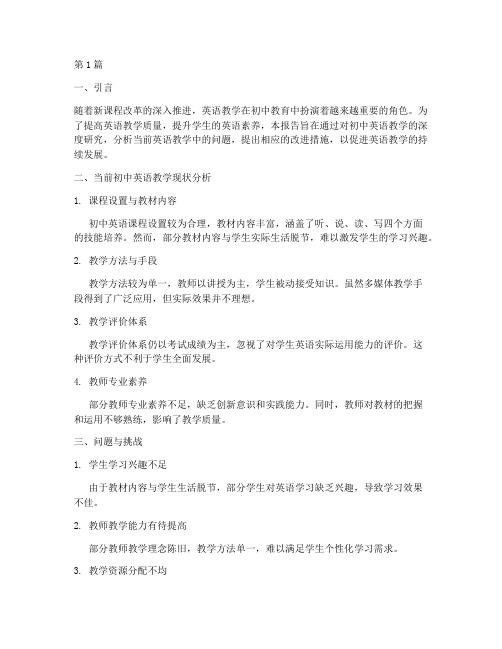
第1篇一、引言随着新课程改革的深入推进,英语教学在初中教育中扮演着越来越重要的角色。
为了提高英语教学质量,提升学生的英语素养,本报告旨在通过对初中英语教学的深度研究,分析当前英语教学中的问题,提出相应的改进措施,以促进英语教学的持续发展。
二、当前初中英语教学现状分析1. 课程设置与教材内容初中英语课程设置较为合理,教材内容丰富,涵盖了听、说、读、写四个方面的技能培养。
然而,部分教材内容与学生实际生活脱节,难以激发学生的学习兴趣。
2. 教学方法与手段教学方法较为单一,教师以讲授为主,学生被动接受知识。
虽然多媒体教学手段得到了广泛应用,但实际效果并不理想。
3. 教学评价体系教学评价体系仍以考试成绩为主,忽视了对学生英语实际运用能力的评价。
这种评价方式不利于学生全面发展。
4. 教师专业素养部分教师专业素养不足,缺乏创新意识和实践能力。
同时,教师对教材的把握和运用不够熟练,影响了教学质量。
三、问题与挑战1. 学生学习兴趣不足由于教材内容与学生生活脱节,部分学生对英语学习缺乏兴趣,导致学习效果不佳。
2. 教师教学能力有待提高部分教师教学理念陈旧,教学方法单一,难以满足学生个性化学习需求。
3. 教学资源分配不均城乡学校之间、不同班级之间教学资源分配不均,影响了教学质量的提高。
4. 家庭教育与学校教育脱节部分家长对英语学习重视不够,导致家庭教育与学校教育脱节,影响了学生的学习效果。
四、改进措施1. 优化课程设置与教材内容根据学生实际需求,优化课程设置,增加与生活相关的教学内容,提高学生的学习兴趣。
2. 创新教学方法与手段采用多样化的教学方法,如任务型教学、合作学习等,激发学生的学习兴趣,提高教学效果。
3. 完善教学评价体系建立多元化的评价体系,注重对学生英语实际运用能力的评价,促进学生的全面发展。
4. 提高教师专业素养加强教师培训,提高教师的专业素养和教学能力,为提高教学质量奠定基础。
5. 优化教学资源配置合理分配教学资源,缩小城乡学校之间、不同班级之间的差距,促进教育公平。
英语研究性学习报告
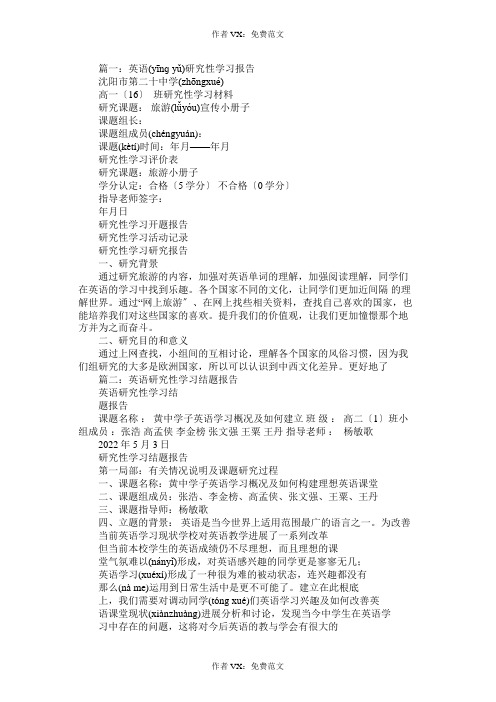
篇一:英语(yīnɡ yǔ)研究性学习报告沈阳市第二十中学(zhōngxué)高一〔16〕班研究性学习材料研究课题:旅游(lǚyóu)宣传小册子课题组长:课题组成员(chéngyuán):课题(kètí)时间:年月——年月研究性学习评价表研究课题:旅游小册子学分认定:合格〔5学分〕不合格〔0学分〕指导老师签字:年月日研究性学习开题报告研究性学习活动记录研究性学习研究报告一、研究背景通过研究旅游的内容,加强对英语单词的理解,加强阅读理解,同学们在英语的学习中找到乐趣。
各个国家不同的文化,让同学们更加近间隔的理解世界。
通过“网上旅游〞、在网上找些相关资料,查找自己喜欢的国家,也能培养我们对这些国家的喜欢。
提升我们的价值观,让我们更加憧憬那个地方并为之而奋斗。
二、研究目的和意义通过上网查找,小组间的互相讨论,理解各个国家的风俗习惯,因为我们组研究的大多是欧洲国家,所以可以认识到中西文化差异。
更好地了篇二:英语研究性学习结题报告英语研究性学习结题报告课题名称:黄中学子英语学习概况及如何建立班级:高二〔1〕班小组成员:张浩高孟侠李金榜张文强王粟王丹指导老师:杨敏歌2022年 5 月 3日研究性学习结题报告第一局部:有关情况说明及课题研究过程一、课题名称:黄中学子英语学习概况及如何构建理想英语课堂二、课题组成员:张浩、李金榜、高孟侠、张文强、王粟、王丹三、课题指导师:杨敏歌四、立题的背景:英语是当今世界上适用范围最广的语言之一。
为改善当前英语学习现状学校对英语教学进展了一系列改革但当前本校学生的英语成绩仍不尽理想,而且理想的课堂气氛难以(nányǐ)形成,对英语感兴趣的同学更是寥寥无几;英语学习(xuéxí)形成了一种很为难的被动状态,连兴趣都没有那么(nà me)运用到日常生活中是更不可能了。
建立在此根底上,我们需要对调动同学(tóng xué)们英语学习兴趣及如何改善英语课堂现状(xiànzhuàng)进展分析和讨论,发现当今中学生在英语学习中存在的问题,这将对今后英语的教与学会有很大的指导意义。
初中英语口语能力提高研究性学习

初中英语口语能力提高的研究性学习光泽三中[摘要]:根据新教学大纲的要求和现代教学理论,文章对初中学生口语教学进行了实验与探索,为提高课堂教学效果,提供了一些可借鉴的经验。
[关键词]:英语;口语;实验一、研究背景:据调查,我国中学英语教学方法的特点为:教师讲得多,学生操练少;课堂使用英语来教学的比率低;教学侧重在语言知识点的传授。
加之受应试教育的影响,重知识传授,轻语言实践;重考试成绩,轻能力培养;离新课程标准提出的建立初步的语感,形成有效的学习策略,为终身学习打下基础,仍存在较大的差距。
二、研究目的:本课题为笔者在教学实践中的思考并付诸行动所作的尝试,诣在为初中英语教学改革,提高课堂效果及日后小班化模式提供可借鉴的经验。
三、研究的理论依据(一)教学论依据语言习得理论研究得出:人们在交际中所使用的语言并非来自大脑一个贮存库,大脑中可能存在两个语言贮存库,一个库中装的是词短语句子,另一个装的是遣词造句的规则。
人们表达意义时,词句库中的话可以很流利地出来,而从语法库中出来则需较多时间。
因此,在真实的语言环境中,人们更愿意从词句库中提取有用信息进行交流,口语的流利程度与现有的词句贮存量有关。
由此可见,完善“词句库”就成了英语教学的关键。
学习者在交际场景下使用已经学过的语言,这些语言才能在“词句库”中保存。
所以加强口语方面的训练是非常必要的。
(二)教学大纲的依据2000年3月教育部颁布九年义务教育初级中学英语教学大纲,指出初中英语课程应“突出语言的实践性,注意培养学生综合运用英语的能力”。
大纲还要求教师上课时间不超过课时的30%,其它时间应该给学生操练,培养学生听说读写各方面的技能。
当然学生年级不同,应分阶段有所侧重。
一位英国语言学家指出:如果教师能组织一些活动来吸引学生,把注意力放在语言的意义上使用所学的外语,通过交流来解决问题,那么语言学习就会自然发生元认知。
(三)树立现代教学观念学生的头脑不是知识的填充器,学生是具有成长潜能的生命体,蕴藏着主动发展的机制;学校不可能教给学生受益终身的知识,但可以教给学生学习的本领:和谐互动的师生关系,大胆设计提高学生认知、情感与行为技能,融课堂心理辅导于一体的教学活动,同样是促进学生学习的强劲动力。
初中英语教育实践研究报告范文

初中英语教育实践研究报告范文全文共12篇示例,供读者参考篇1Title: A Student's Perspective on English Teaching in Middle SchoolIntroductionAs a middle school student, learning English is a huge part of my life. I spend several hours each week in English classes, and it's one of the most important subjects. But how effective are the teaching methods used by my English teachers? In this report, I'll share my thoughts and experiences as a student in the English language classroom.Textbooks and CurriculumThe textbooks we use are pretty standard ones approved by the county school board. They cover grammar, vocabulary, reading comprehension, writing, and some speaking practice. I find the content to be clear and easy to understand most of the time. However, the topics can be a bit dry and boring at times. I wish we had more engaging, real-world examples and dialogues.The curriculum moves at a good pace, introducing new concepts systematically. We build on what we learned previously. What I don't like is the heavy emphasis on preparing for standardized tests. It feels like we spend too much class time on strategies for test-taking rather than actually using and practicing English in meaningful ways.Teaching MethodsMost of my English teachers use a combination of lectures, going over textbook exercises as a class, and giving us homework assignments and quizzes. Occasionally we watch videos or have group activities, but lectures are definitely the main method.I have to admit, the lectures can be really dry and hard to pay attention to, especially after we've already been sitting through hours of other classes that day. The teachers try to make them interactive by asking us questions, but we don't get much opportunity for open discussion or debates.When we do pair or group work, I find it very helpful to practice conversing in English with my classmates. Roleplaying, discussions, and projects are the times when I feel I'm really using and reinforcing what I've learned.Learning EnvironmentThe classroom setup is pretty traditional - rows of desks or tables facing the board and teacher's desk. We sometimesre-arrange the furniture for group work, but not very often. The rooms are reasonably well-equipped with projectors, audio equipment, and decent lighting and temperature control.What I don't like is the lack of opportunities to practice English outside of class time. There aren't any English clubs, immersion events, or partnerships with English speakers in the community. It would be great to have more ways to apply my English skills in real-world environments.Assessment MethodsStudents are primarily assessed through tests, quizzes, homework assignments and classroom participation. We have unit tests for each textbook chapter as well as midterm and final exams. A lot of weight is put on the scores from these standardized tests.While the tests check our grammar, vocabulary and reading abilities, I don't feel they adequately measure our speaking and real-world communication skills. I wish we had moreopportunities for open-ended assignments, presentations, and projects that could demonstrate our overall English proficiency.RecommendationsBased on my experiences as a student, here are some recommendations for improving English teaching in middle schools:Update curriculum with more relevant, engaging topics and materials that show real-world applications of English. This could include podcasts, news articles, video clips and other authentic resources.Allocate more class time for interactive activities like discussions, debates, presentations and projects where students can practice actively using English in spontaneous situations.Offer extracurricular options like English clubs, immersion activities with native speakers, or partnerships with local companies/organizations that use English for students to apply their skills.Revise assessment methods to include more performance-based components like oral exams, presentations and portfolio assignments in addition to traditional tests/quizzes.This will incentivize developing well-rounded communication abilities.Provide teacher training on effective strategies for English language instruction such as task-based learning, communicative approaches and incorporating more technology/multimedia into lessons.ConclusionWhile the foundations of English education in my middle school are solid, I believe there are areas that could be improved to make it a more engaging, productive and practical experience. With some updates to the curriculum, more interactive teaching methods, an enhanced learning environment and revised assessment approaches, we could become more confident and capable English communicators ready for the real world.篇2My English Learning Journey in Middle SchoolIntroductionAs an 8th grader about to graduate from middle school, I've spent the last three years immersed in learning English. Looking back, I've come a long way from those first few classes! English isa core subject here, and my school puts a big emphasis on helping us build solid language skills. In this report, I'll share my experiences, what worked well, what was challenging, and my thoughts on English education in middle schools.My Background and Early ClassesI started learning English basics in elementary school, but everything ramped up when I began 6th grade. At first, the pace and intensity felt overwhelming. We had English class every day, often with separate periods for reading, writing,speaking/listening, and grammar instruction. The vocabulary lists and grammar rules seemed never-ending!Those early classes focused heavily on building our foundational knowledge. We spent a lot of time memorizing vocabulary word lists organized by topic. We also did tons of drill exercises, diagramming sentences, and learning about verb tenses, parts of speech, and the other nitty-gritty grammar details. While tedious at times, I realized later how crucial it was to cement those basics.Engaging Activities That HelpedWhat stands out most in my mind from 6th grade English classes were the engaging activities that broke up the routine.Our teacher was big on games, songs, chants, and other interactive elements to reinforce what we were learning. Vocabulary games like Pictionary, bingo, charades andround-robin word defining were fun ways to solidify word meanings in our minds.For grammar practice, we'd do activities like grammar auctions (bidding on correct sentence examples), grammar rap battles, and team competitions around identifying parts of speech or sentence types. I especially loved the singing and chanting, which made verb conjugations and grammar rules stick through repetition and melody.Appreciating Reading and WritingAs we progressed into 7th and 8th grade, the curriculum expanded from the foundational skills to higher-level reading comprehension, writing, speaking, and analytical skills. We started exploring different genres of literature, from short stories and novels to poetry, plays, and nonfiction articles.At first, I found analyzing literature pretty dry and tedious. However, once I got the hang of strategies like finding the main idea, making inferences, identifying themes and character motivations, I started appreciating literature on a deeper level.Discussions helped bring the texts to life as we shared perspectives and drew out richer meanings.On the writing side, we followed the full process from brainstorming to drafting, revising, editing, and publishing. We learned about different formats like narratives, persuasive essays, research reports, and more. My writing definitely improved through rounds of feedback and having models to emulate. However, I still find citing evidence and developing a smooth logical flow challenging.Conquering the Fear of SpeakingMy biggest struggle has been with the speaking and listening components of English class. As a naturally shy person, I've had to work hard to overcome my fear of public speaking and conversational mistakes. Fortunately, my teachers created a supportive environment with lots of opportunities for lowstakes practice.We did activities like simulated conversations, role plays, debates, presentations, and group projects with an emphasis on speaking up. While nerve-wracking at first, the more I practiced, the more confidence I gained. A breakthrough moment was giving my first big research presentation in 8th grade. While farfrom perfect, getting through it felt like a huge weight off my shoulders.Measuring Progress and Areas for ImprovementBetween regular testing, quizzes, and standardized English exams each year, we got plenty of feedback on our progress across reading, writing, speaking, and listening skills. Overall, my scores put me at or above the expected levels for my grade. However, there's still plenty of room for improvement as I look ahead to high school English classes.My teachers have emphasized areas like expanding my academic vocabulary, varying my sentence structures for better flow, and backing up claims with stronger textual evidence in my writing. For speaking, I need to focus on minimizing filler words, thinking through responses, and projecting more confidence. With listening, I occasionally still struggle to catch every word, especially with unfamiliar accents.Looking AheadEnglish will continue being a major part of my studies throughout high school and beyond. While the journey has felt challenging at times, I'm grateful for how much my skills have grown over these past three years of middle school. Theinteractive activities, opportunities for practice and feedback, and supportive teachers have all played an important part.As I look ahead, I know I'll need to stay dedicated to expanding my vocabulary, perfecting my grammar, reading a variety of complex texts, and honing my communication abilities. English fluency will open up many opportunities for me, from academics to career paths. With continued hard work and the right learning approach, I'm confident I can achieve the level of English mastery I'll need for future success.篇3Title: Learning English in Middle School - A Kid's ViewIntroductionHi there! My name is Jenny and I'm a 5th grader at Oakwood Elementary School. I love learning new things, especially about different languages and cultures. This year, I did a research project all about how English is taught in middle schools. I interviewed teachers, observed some classes, and looked at textbooks and lesson plans. I thought it would be really cool to share what I learned with you!How English is TaughtIn the middle schools I looked at, English class happens almost every day for around 50 minutes. The classes have between 20-30 students of different English levels. From what I saw, teachers use a mix of techniques like:Vocabulary Lists - Students get lists of new vocab words to learn meanings, pronunciation, etc. The words are often connected to the unit theme.Reading Passages - There are longer texts that explore different topics. Students read and answer comprehension questions.Grammar Study - Covering English grammar rules for things like verb tenses, sentence structure, etc. Lots of practice exercises.Speaking Activities - Pair and group conversational activities let students practice speaking skills.Writing Assignments - Short paragraphs and essays allowing practice of writing skills.Multimedia - Using videos, online exercises, language apps to engage students differently.Projects - Longer assignments like presenting, making videos/posters to apply skills.Depending on the school, they either have one English teacher or sometimes switch between teachers for different units/skills.Popular Textbooks and MaterialsThe most widely used textbook series I saw was published by Oxford University Press called "Incredible English." It comes with texts, workbooks, multimedia resources, and teacher's manuals. Another popular one was "Top Notch" from Pearson publishers.Schools seemed to supplement the main textbooks with lots of other materials too. Things like reading libraries with novels, short stories, newspapers, and magazines. Or online exercise websites and language learning apps. Some used videos from YouTube channels like "English Class V.O.A. Learning English" or "BBC Learning English."Many classrooms had educational posters and games related to vocabulary, grammar, reading strategies, etc. Teachers get pretty creative finding engaging resources to use!Challenges of Learning EnglishFrom talking to students, some of the biggest challenges seem to be:Pronunciation - Speaking clearly with proper pronunciation of certain English sounds.Vocabulary - Learning and retaining all the new vocabulary words.Grammar - Understanding and applying all the grammar rules correctly.Speaking Confidence - Feeling shy or nervous to speak out and practice conversational skills.Listening Comprehension - Understanding Englishaudio/video sources can be difficult.Different students struggle more with certain aspects based on their personal learning styles and strengths. Consistent practice seems to be key for improving overall.What I Think About ItIn my opinion, learning English seems both really fun and really challenging at the same school level. I can see how the variety of activities like reading, writing, speaking, listening would allow students to practice using English in different ways. The multimedia and group/pair work also looks engaging.However, I imagine having to learn all those grammar rules plus tons of new vocabulary would feel overwhelming at times. Speaking out and doing presentations also seems prettynerve-wracking, especially in front of others. I'm already a bit nervous about English classes in middle school!I think the teachers have a tough job making classes interesting while covering so much material. But it seems like most try to balance textbook work with other interactive resources. Keeping students motivated and providing enough practice opportunities is probably difficult.Overall though, middle school seems like a great time to build solid English foundations. The lessons look designed to develop well-rounded skills in all areas through diverse techniques. As challenging as it might be, developing abilities at that age will definitely pay off down the road.ConclusionWell, that's my kid's perspective on how English is commonly taught in middle schools! I had a blast researching this topic and getting a preview of what's to come. While it won't be easy, I'm really looking forward to continuing my English studies soon. Being bilingual opens up so many opportunities.I hope you found my observations interesting and insightful. Learning a new language allows connecting to different cultures and viewpoints. It's such a valuable lifelong skill. I'm grateful my school district makes English education a priority starting at the middle level. Maybe I'll be an English teacher someday too!篇4My Big Brother's Important English ExamMy big brother Xiao Ming just took a really important English exam called the Anqing High School Senior Year Mock Exam. It was a big deal because it helps get ready for the even bigger gaokao exam that all students have to take to get into university in China. Xiao Ming has been studying so hard for months!When he got his score back, he was pretty happy but also a little disappointed. He got a 78 out of 100 on the English portion. That's a pretty good score, but Xiao Ming was hoping for higher since English is one of his best subjects usually.My parents have different opinions about the score. My mom thinks 78 is excellent and she's proud of Xiao Ming for working so hard. She says the mock exam is just practice and the real gaokao test is what matters most. My dad though, he wantsXiao Ming to keep pushing himself to get an even higher score. Dad thinks if he gets into a prestigious university, it will lead to a good stable job and better life for our family in the future.I don't fully understand what the big deal is, since I'm just a little kid in elementary school. But I know it's very important for growing up and becoming an adult in China. I'll be taking that gaokao test myself in just a few years!Xiao Ming has been going over his exam very carefully to learn from his mistakes. He showed me the different sections. There was listening, reading, grammar, writing and translation. He told me the writing section, where you have to write an essay in English, is one of the hardest parts.For the listening, you have to listen to recordings of English speakers and answer questions. Xiao Ming said his English listening skills are pretty good from watching movies and shows, but there were still some tough sections where the speakers talked really fast or used slang he wasn't familiar with.The reading section had long passages to read and answer questions about. Xiao Ming struggled with some of the super long vocabulary words and idioms he hadn't seen before. He told me you have to have a really large English vocabulary to do well on that part.The grammar questions were mostly about verb tenses, parts of speech, clauses and other grammar rules. Xiao Ming has learned English grammar for many years so that was one of his stronger sections, though he said even native English speakers sometimes struggle with all the crazy grammar rules and exceptions.Then for writing the essay, you have to write a longer structured piece, usually an expository or argumentative essay. You're graded on your ideas, organization, grammar, vocabulary and more. Xiao Ming finds it pretty difficult to write a long coherent piece with few mistakes, especially under timed pressure of the exam.The final translation section asked students to translate sentences and short paragraphs between English and Chinese. Xiao Ming said this was pretty hard because you really need to understand the deeper meaning and conventions in both languages to translate accurately.Overall, Xiao Ming was okay with his 78 score, but he's realizing he needs to work even harder now to get an even higher score on the real gaokao exam. He's going to study English vocabulary using flashcards, read more books andarticles to improve reading comprehension, practice listening to TV shows and podcasts, and do lots of timed writing practice.I tried to give Xiao Ming a pep talk to cheer him up. I told him I think he's amazing at English already and so smart! He works incredibly hard, way harder than me. I said a 78 is still a really good score and he should be proud. I know Xiao Ming is doubling down to get a 90+ on the real test, but I reminded him that his score doesn't define who he is. As long as he tries his best, that's what matters most.I look up to Xiao Ming so much. Seeing how intensely he prepares for these huge exams makes me realize I'll need to work that hard too when I'm in high school. For now though, I just focus on the math tests in my 3rd grade class! I'm rooting for Xiao Ming to ace the gaokao. I have no doubt he'll make our family proud, no matter what score he gets. Xiao Ming, jiayou!篇5初中英语教育实践研究报告引言大家好!我是一名小学生,我今天想和大家分享一下我对初中英语教育的实践研究。
研究性学习-英语口语的研究报告
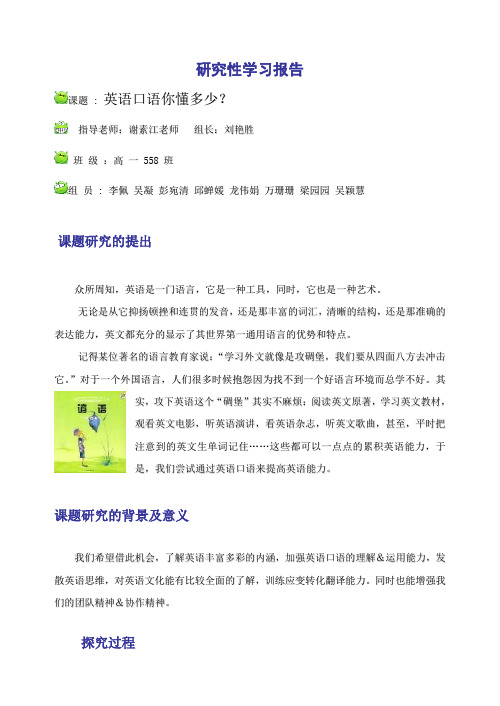
研究性学习报告课题:英语口语你懂多少?指导老师:谢素江老师组长:刘艳胜班级:高一558班组员:李佩吴凝彭宛清邱蝉媛龙伟娟万珊珊梁园园吴颖慧课题研究的提出众所周知,英语是一门语言,它是一种工具,同时,它也是一种艺术。
无论是从它抑扬顿挫和连贯的发音,还是那丰富的词汇,清晰的结构,还是那准确的表达能力,英文都充分的显示了其世界第一通用语言的优势和特点。
记得某位著名的语言教育家说:“学习外文就像是攻碉堡,我们要从四面八方去冲击它。
”对于一个外国语言,人们很多时候抱怨因为找不到一个好语言环境而总学不好。
其实,攻下英语这个“碉堡”其实不麻烦:阅读英文原著,学习英文教材,观看英文电影,听英语演讲,看英语杂志,听英文歌曲,甚至,平时把注意到的英文生单词记住……这些都可以一点点的累积英语能力,于是,我们尝试通过英语口语来提高英语能力。
课题研究的背景及意义我们希望借此机会,了解英语丰富多彩的内涵,加强英语口语的理解&运用能力,发散英语思维,对英语文化能有比较全面的了解,训练应变转化翻译能力。
同时也能增强我们的团队精神&协作精神。
第一阶段:研究动员、确定课题要以小组合作的形式进行探究,制订课题研究方案。
第二阶段:制定方案,分组调查分工通过各种有效途径收集英语谚语相关材料,根据实际情况进行有选择的筛选并整理分析资料,挖掘语言的内涵。
第三阶段:整理材料,交流信息,论证结果总结课题研究工作,撰写和修改课题研究报告,对研究分析成果作综合性总评探究方法通过查阅书籍、报刊杂志、互联网等形式,在老师的指导下,结合自己的基础知识、能力,收集有关资料,撰写相关论文及手抄报,参加课题研究成果展示、答辩交流等活动。
研究课题的有利条件&遇到的困难英语资源丰富,与生活息息相关,在日常学习与生活中对资料的收集比较轻松,也能让大家接受,容易调动研究兴趣。
这是我们进行研究的有利条件。
但我们也看到了其中的几个难点。
由于英语口语运用了大量俗语谚语,打破了语法规则,使得理解难度加大,而且谚语涉及生活各个方面,选择难度大,我们容易按照中文习惯而造成理解的错误。
- 1、下载文档前请自行甄别文档内容的完整性,平台不提供额外的编辑、内容补充、找答案等附加服务。
- 2、"仅部分预览"的文档,不可在线预览部分如存在完整性等问题,可反馈申请退款(可完整预览的文档不适用该条件!)。
- 3、如文档侵犯您的权益,请联系客服反馈,我们会尽快为您处理(人工客服工作时间:9:00-18:30)。
初中英语研究性学习报告范文精选5篇-
口语研究性报告范文
研究背景
在初中阶段,学生需要学好英语,掌握口语交流的基本能力。
本报告旨在分享五篇优秀的研究性研究报告,以此鼓励更多的同学研究探究英语知识,提升自己的口语表达能力。
研究方法
本次报告收集了五篇初中英语口语研究性研究报告,涵盖了不同的主题和研究方法。
通过研究这些报告,我们可以了解到如何撰写一篇出色的口语研究性研究报告。
研究成果
1. 主题:如何提高口语能力
研究方法:访谈法
研究结论:多说多练是提高口语能力的最佳途径。
2. 主题:英语研究方法
研究方法:问卷调查法
研究结论:阅读和听力是研究英语的重要方法。
3. 主题:英语口语比赛经验分享
研究方法:实证研究法
研究结论:练和准备是赢得口语比赛的关键。
4. 主题:短语和惯用语的使用
研究方法:实地考察法
研究结论:熟练掌握短语和惯用语能有效提升口语表达水平。
5. 主题:中国文化在英语研究中的运用
研究方法:文献研究法
研究结论:借鉴中国文化在英语研究中能使个人表达更丰富、得体。
结论
通过以上五篇研究性学习报告的分享,我们可以看到不同主题和方法带来的不同结论。
学习不止是书本上的知识,同时也需要我们自己的实践和探究。
希望通过这次报告能够激发更多同学热爱学习英语,勇于探索,不断提升自己的口语交流能力。
